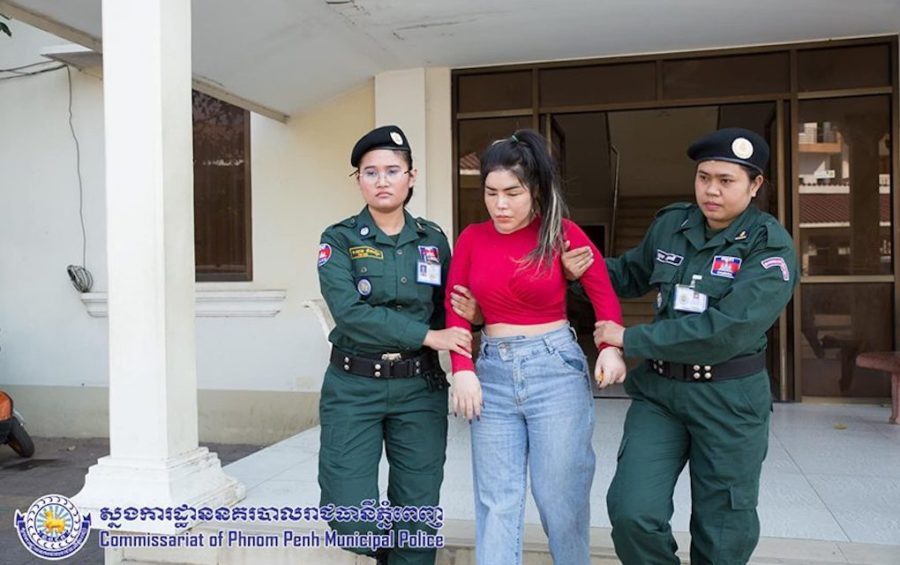An online clothes seller was questioned in court and accused by police of committing pornography crimes on Thursday, after posting photos of herself in supposedly revealing attire on the same day that she was “educated” not to do so by authorities.
The allegations came after Prime Minister Hun Sen this week ordered ministries to stop women from posting online sales videos while wearing clothes that showed too much skin in a move that gender equality advocates say restricts women’s rights.
Ven Rachna, 39, who sells clothing via her Facebook page under the name Thai Srey Neang, was questioned by the Phnom Penh Municipal Court after being arrested on Wednesday afternoon, according to a post on the Phnom Penh municipal police’s Facebook page.
Local authorities first detained Rachna on Tuesday and brought her to a police station for “education,” the municipal police said, adding that the woman signed a document stating that she would not post any more suggestive photos.
However, police said after being released she uploaded a photo of herself wearing underwear later the same day. Police accused her of committing pornography crimes in violation of the nation’s anti-human trafficking law.
Convictions for selling and distributing pornography carry a maximum punishment of one month in prison and a fine of 200,000 riel ($50), while sentences for producing pornography may be punished with up to a year in prison and a fine of 2 million riel ($500).
Court spokesman Kuch Kimlong confirmed that Rachna was being questioned by a court prosecutor on Thursday.
On Wednesday, the Phnom Penh municipal police posted a video to its Facebook page in which Rachna apologizes for violating cultural norms, and appears to be reading from a script.
“I would like to make a public apology because I made videos and photos with sexy characteristics, which went against Cambodian norms and tradition, especially affecting the honor of Cambodian women,” she says in the video. “I hope esteemed brothers and sisters can pardon the mistakes that I’ve made.”
The seller was targeted after Hun Sen this week denounced women who wear revealing clothing while selling products in online videos.
In a speech, he ordered the Telecommunications and Interior ministries to investigate “online crimes that affect social morality,” and instructed authorities to monitor online sellers, and “go and educate them on the spot and tell them that I’m asking you to change your clothes.”
“You sell products, not your breasts, just saying frankly,” Hun Sen said.
“This is a violation of culture and tradition, and that is a factor behind sexual abuse and violence against women and human trafficking,” he added.
The Telecommunications Ministry would meet with the Council of Ministers on Friday to discuss how they would monitor and enforce Hun Sen’s order, ministry spokesman Im Vutha said on Thursday.
Local and national police have already begun asking sellers to stop wearing skimpy clothes in videos, Vutha said.
When asked whether the ministry monitors the morality of other social media users’ online activities, including men’s, he said that he follows the prime minister’s orders, and that other bodies, such as the Culture Ministry, are responsible for restrictions on content.
Amnesty International’s regional director Nicholas Bequelin on Wednesday called Hun Sen’s comments a “despicable and dangerous instance of victim-blaming,” and warned that Cambodia appeared to be using state surveillance mechanisms to discriminate against women.
“The coerced moral ‘education’ of women by police is inherently arbitrary,” Bequelin said in a statement prior to authorities’ accusations against Rachna.
“None of these women have been accused of breaking any law, and the police appear to be acting solely on the basis of Hun Sen’s personal whim,” he added.
Bunn Rachana, executive director of women’s advancement organization Klahaan, told VOD that attempts to control women’s decisions do not prevent sexual harassment and abuse, but rather it condones the behavior of harassers and abusers, and places the blame on women.
“It’s almost like [officials] are empowering perpetrators to take actions that violate women and girls,” she said.
However, some Phnom Penh clothing vendors said they were not bothered by Hun Sen’s statements, and even supported his views.
“I think it’s a good thing because I see on Facebook women wear only their bras and it’s not a good look for our country,” said Lim Sreyda, general manager of a Brand Collection clothing store in Tuol Tompoung I commune.
Sreyda said the fashion outlet’s models used to post videos of themselves wearing only stylish bras and low-cut clothes in an effort to bring more customers into their five stores in Phnom Penh.
But models started dressing more conservatively in videos after the store’s Facebook page began receiving messages from men asking for dates, she added.
Sreyoun, a 24-year-old who manages clothing shop Roxy Rassy, said that she also supported a ban on “sexy” online sellers because she thought videos of women in revealing clothing put forward a bad image of Cambodia, especially to other countries.
“If [Hun Sen] can do this, it will be a good choice for Cambodian people,” she said, noting that the prime minister’s order would also help brick-and-mortar shops like her own compete with online sellers who don’t have to worry about overhead costs like rent and staff salaries.
But others say a government crackdown on clothing sellers’ cleavage affected more than businesswomen’s bottom lines.
Rachana, of Klahaan, said that Cambodia needs to break patriarchal traditions in society in order to promote the rights and equal treatment of women.
“It’s possible to fix [a male-dominated society] if the leadership of the country promotes human rights standards…and takes all necessary steps to correct unfair social norms,” she told VOD.
“This is possible to do, but if Hun Sen continues to say that women should cover their bodies, it’s not going to happen,” she added.













